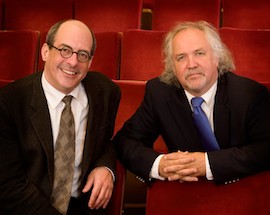
Photo by JD Scott
Atlanta Symphony management locked out the players on Sunday as eight months of collective bargaining brought no results and the existing contract expired at midnight.
According to a management statement, the impasse “may delay or cancel portions of the 2014-15 season,” which was supposed to be a celebration of its 70th anniversary, set to open on Sept. 25. The Atlanta Symphony Orchestra Players Association, which accepted deep pay cuts two years ago, said "management had refused to budge from an offer under which the musicians would continue to hemorrhage income and lose orchestra positions.”
“We are all extremely disappointed that we do not have a new contract,” said ASO President Stanley E. Romanstein. “While we value the art and the artists of the ASO enormously, we believe we must develop a new model that will allow us to balance our artistic and financial needs. Clearly, that is not the model we have today.”
The ASO has had 12 consecutive years of deficit operations. In the recently completed 2013–2014 fiscal year, it had a $2 million deficit, even with a significant contribution from ASO Presents, the concert promotional arm of the ASO. Accumulated debt is approximately $5 million. The ASO endowment has declined to about $70 million today as the orchestra has taken additional distributions of $18 million to cover its accumulated deficits.
The organization’s financial woes would be even more pronounced if it wasn’t a division of the Woodruff Arts Center (WAC). Conservatively, the WAC provides about $3.7 million in annual support by absorbing unallocated expenses and contributing to support the art. The ASO is one division of the Woodruff Arts Center which also includes the Alliance Theatre, Arts for Learning, and the High Museum of Art.
Before the turn of events on Sunday, there was an unusual move by the orchestra's leaders.
Donald Runnicles, former music director of the San Francisco Opera (and a major force in the success of the Ring mentioned elsewhere in the column), has been music director of Berlin's Deutsche Oper and principal guest conductor of the Atlanta Symphony. He and Atlanta music director Robert Spano were involved in something breaking tradition with music directors' historic public distance from labor negotiations from musicians.
During the last San Francisco Symphony strike, for example, Michael Tilson Thomas made no statement, in spite of the dire situation threatening the orchestra's future, and that was the norm — right or wrong. A recent exception to "maestro's neutrality" was Osmo Vänskä's stand with the Minnesota Orchestra musicians.
Spano and Runnicles were circumspect, but spoke to the issue:
Our doing so bears inherent risks as it may be construed as our taking sides in what again has proved to be a contentious process. We both feel bound by a sense of responsibility and deep commitment to represent and remind everyone what the ASO is all about: its high musical standards and aspirations. Indeed we are charged by contract to create and maintain it.Two years ago, our musicians accepted huge concessions with an expectation that, in so doing, both board and management would be able to steer the organization out of financial distress. We ask the board and management to acknowledge the sacrifice the musicians have already made, and to examine other ways and areas to establish sustainability.

